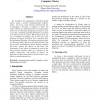Free Online Productivity Tools
i2Speak
i2Symbol
i2OCR
iTex2Img
iWeb2Print
iWeb2Shot
i2Type
iPdf2Split
iPdf2Merge
i2Bopomofo
i2Arabic
i2Style
i2Image
i2PDF
iLatex2Rtf
Sci2ools
111
Voted
PDPTA
2003
2003
Managing Flocking Objects with an Octree Spanning a Parallel Message-Passing Computer Cluster
We investigate the management of flocking mobile objects using a parallel message-passing computer cluster. An octree, a data structure well-known for use in managing a 3D space, is adapted to “span” the cluster. Objects are distributed in the tree, and partitions of the tree are distributed among the processors in such a way that a minimum of global information is required to be shared by the processors. When objects move, the tree is modified accordingly; this in turn may cause partitions to migrate processors. Two constraints drive the distribution algorithm: (1) minimizing message traffic by clustering nearby objects on the same processor, and (2) processor load-balancing. Boids, flocking artificial life forms, embody the objects in this study. The performance of the system is measured in terms of the inter-processor message traffic as a function of the number, interactivity, and mobility of objects. An application of the scheme allows external clients to view objects in speci...
| Added | 01 Nov 2010 |
| Updated | 01 Nov 2010 |
| Type | Conference |
| Year | 2003 |
| Where | PDPTA |
| Authors | Thomas E. Portegys, Kevin M. Greenan |
Comments (0)

